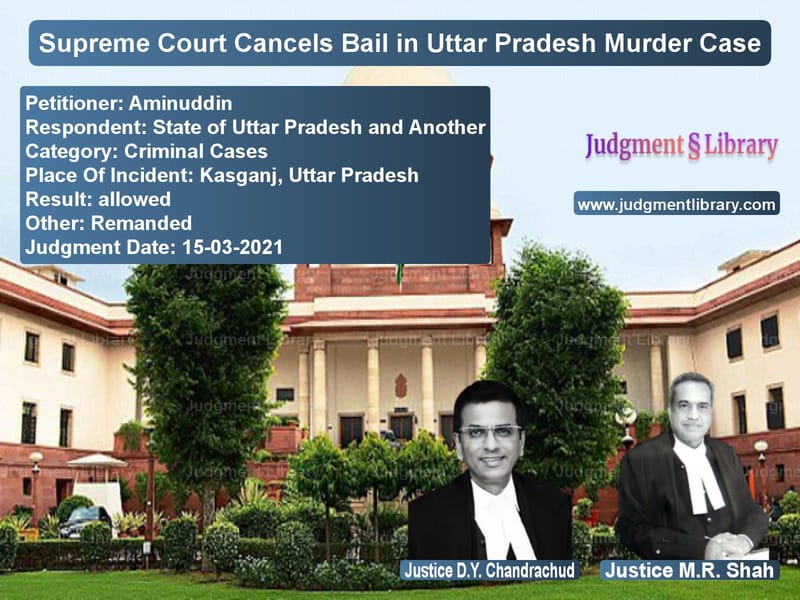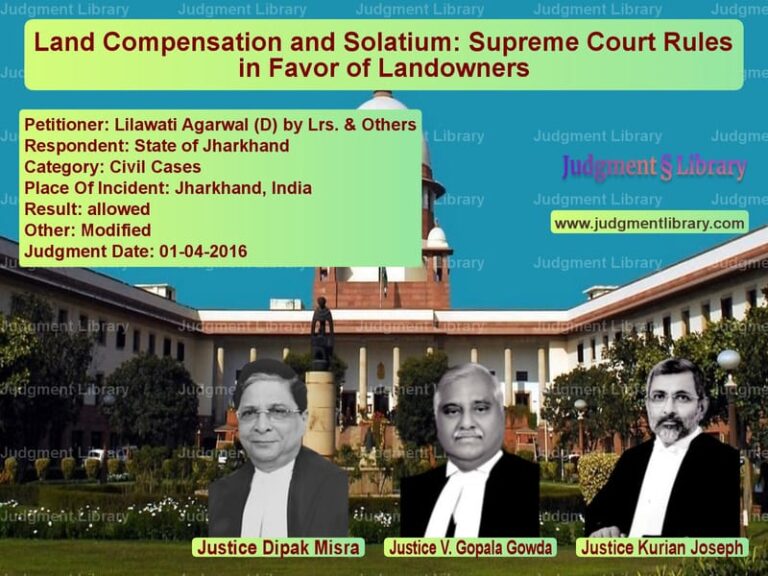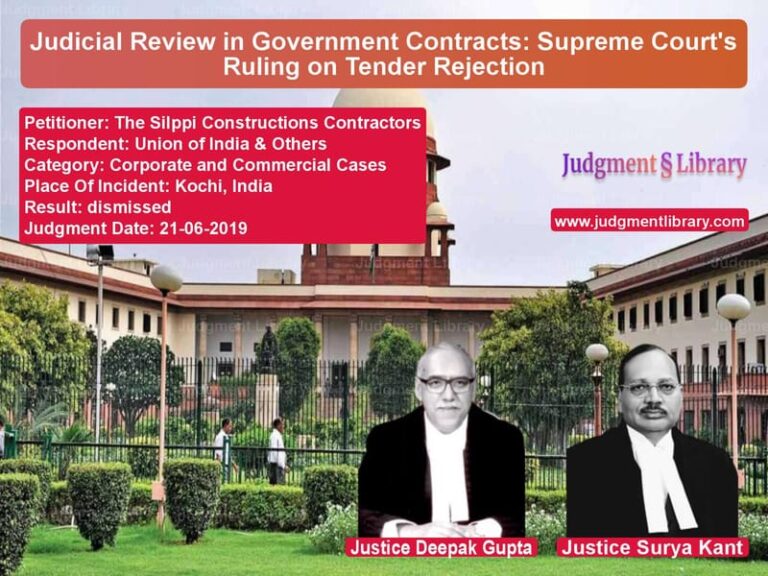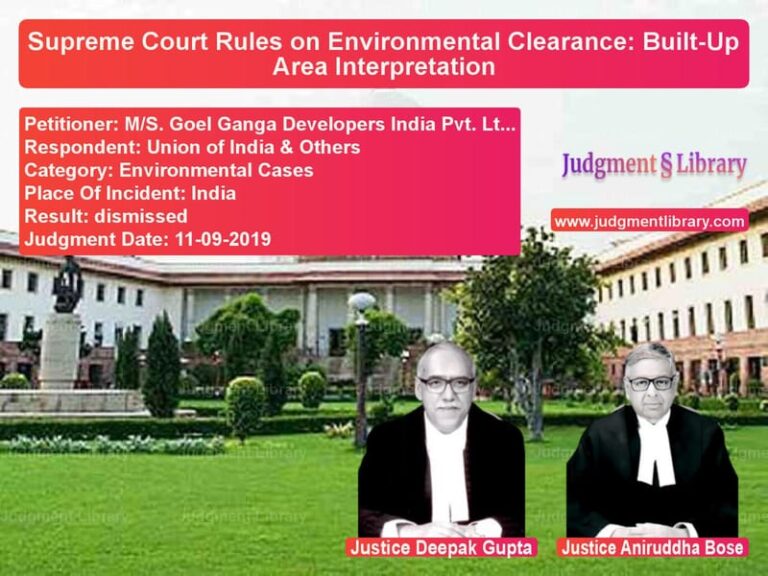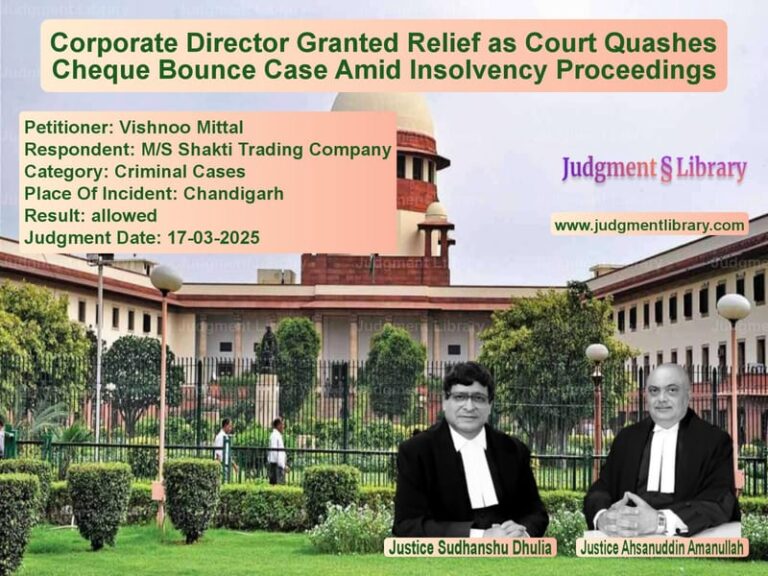Supreme Court Cancels Bail in Uttar Pradesh Murder Case
The case of Aminuddin vs. State of Uttar Pradesh pertains to the brutal murder of the appellant’s son and the subsequent grant of bail to one of the accused. The Supreme Court was called upon to decide whether the High Court erred in granting bail in a case involving serious charges under Section 302 of the Indian Penal Code (IPC).
Background of the Case
On July 10, 2019, an FIR was registered at Kasganj Police Station, Uttar Pradesh, stating that the appellant’s son was attacked with knives by a group of seven people from the same locality. The victim sustained severe injuries and succumbed on the spot. The postmortem report conducted at 1 AM on July 11, 2019, confirmed eight ante-mortem injuries.
The police arrested one of the accused, Imran, on July 11, 2019. The remaining accused were absconding until August 29, 2019, when the second respondent in this appeal surrendered before the court. The Sessions Judge, Kasganj, rejected his bail application on October 31, 2019, citing the seriousness of the offense.
However, the accused later approached the Allahabad High Court, which granted bail on February 25, 2020, citing the “larger mandate of Article 21” (right to life and liberty). This prompted the victim’s father, Aminuddin, to approach the Supreme Court, challenging the High Court’s order.
Key Issues Before the Supreme Court
- Whether the High Court considered relevant factors while granting bail.
- Whether the accused posed a threat to the criminal justice system if released on bail.
- Whether the nature of the crime justified continued detention.
Arguments by the Petitioner (Aminuddin)
The petitioner, father of the deceased, contended:
- The High Court did not provide any substantial reasoning for granting bail except citing Article 21.
- The accused was named in the FIR and played an active role in the murder.
- The crime was committed in broad daylight, and the accused posed a threat to witnesses.
- The Sessions Judge had correctly denied bail considering the gravity of the offense.
Arguments by the Respondents
The respondent (accused) argued:
- The High Court had discretion to grant bail based on constitutional principles.
- Article 21 protects individual liberty, and prolonged incarceration should be avoided before conviction.
- There was no direct evidence linking the accused to the murder beyond the FIR.
Supreme Court’s Analysis
1. Importance of Reasoned Orders in Bail Cases
The Court underscored the importance of reasoned bail orders, stating:
- “Merely recording ‘having perused the record’ and citing ‘the larger mandate of Article 21’ does not constitute a reasoned judicial order.”
- “The High Court failed to consider the gravity of the offense and the likelihood of the accused interfering with the investigation.”
2. Balance Between Liberty and Public Interest
The Court acknowledged that while Article 21 protects liberty, serious criminal cases require careful scrutiny. It held:
- “The liberty of an individual must be balanced against the interest of the criminal justice system.”
- “Granting bail in a murder case without assessing the seriousness of the allegations undermines the administration of justice.”
3. Failure to Consider the Victim’s Rights
The Court emphasized that the rights of the victim’s family must also be considered:
- “The criminal justice system cannot operate solely in favor of the accused; the victim’s rights and societal interests must also be protected.”
- “The accused was involved in a brutal killing, and the prosecution’s case was strong.”
Final Judgment
The Supreme Court set aside the Allahabad High Court’s bail order and directed the accused to surrender immediately. It ruled:
- The High Court failed to consider key factors before granting bail.
- The seriousness of the crime warranted continued detention.
- The accused must be taken into custody to ensure a fair trial.
Implications of the Judgment
This ruling has several significant legal implications:
- It reinforces that bail orders must be based on well-reasoned judicial assessments.
- It upholds the importance of protecting victims’ rights in the bail process.
- It clarifies that Article 21 does not automatically override the seriousness of a criminal offense.
The Supreme Court’s decision ensures that procedural fairness is maintained while balancing the need for justice in serious criminal cases.
Petitioner Name: Aminuddin.Respondent Name: State of Uttar Pradesh and Another.Judgment By: Justice D.Y. Chandrachud, Justice M.R. Shah.Place Of Incident: Kasganj, Uttar Pradesh.Judgment Date: 15-03-2021.
Don’t miss out on the full details! Download the complete judgment in PDF format below and gain valuable insights instantly!
Download Judgment: aminuddin-vs-state-of-uttar-prade-supreme-court-of-india-judgment-dated-15-03-2021.pdf
Directly Download Judgment: Directly download this Judgment
See all petitions in Murder Cases
See all petitions in Bail and Anticipatory Bail
See all petitions in Judgment by Dhananjaya Y Chandrachud
See all petitions in Judgment by Mukeshkumar Rasikbhai Shah
See all petitions in allowed
See all petitions in Remanded
See all petitions in supreme court of India judgments March 2021
See all petitions in 2021 judgments
See all posts in Criminal Cases Category
See all allowed petitions in Criminal Cases Category
See all Dismissed petitions in Criminal Cases Category
See all partially allowed petitions in Criminal Cases Category

